| Andrew Neill |
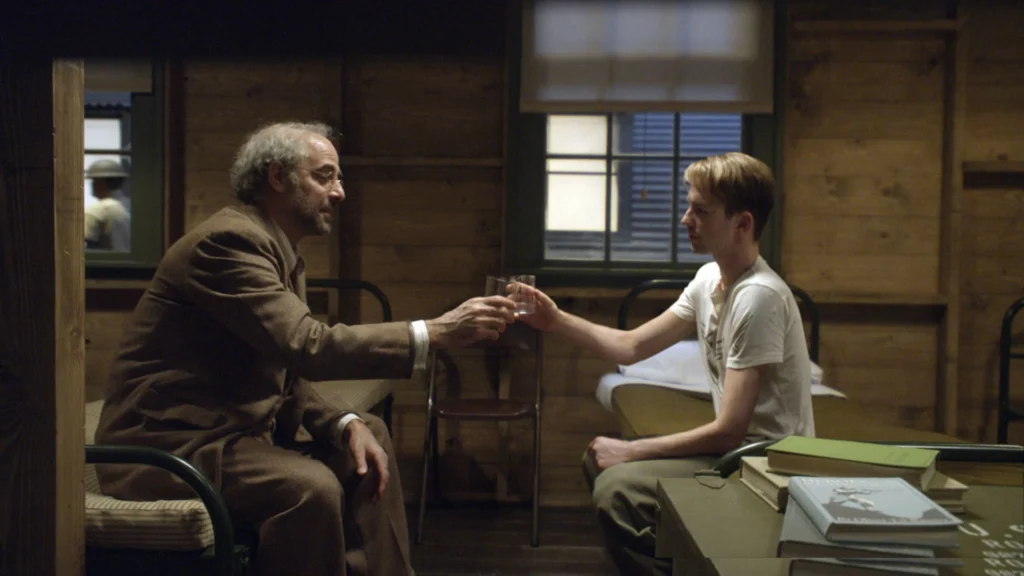
Captain America: The First Avenger plays on glorious 35mm at the Trylon Cinema from Sunday, August 24th through Tuesday, August 26th. For tickets, showtimes, and other series information, visit trylon.org.
I’m in a hotel room in Appleton, Wisconsin, and turn on the TV. It’s on CNN, but instead of some talking head feeding the news cycle, there’s a man I recognize but haven’t seen in a long time. He’s sauntering down a narrow street between ancient, eroding buildings and enters a door that’s older than my country. He’s in a restaurant, and suddenly he’s eating handmade orecchiette tossed in a sauce that’s been simmering all day, with ingredients from the surrounding region, prepared by a woman who’s perfected the dish over decades of monastic repetition. The man takes a bite and makes a face that makes me want to eat that pasta right friggen now, because this man knows how to play to camera. While he’s been searching for Italy, I have the realization that I’ve been searching for him.
His name is Stanley Tucci, and before he was America’s unofficial, self-appointed ambassador to Italy, he was one of Hollywood’s most reliable supporting players. The Blank Check podcast coined the phrase a touch of the Tucc’ after the actor’s ability to enter a picture and imbue it with his particular je ne sais quoi. Inspired by the Trylon’s upcoming screening of Captain America: The First Avenger, I’m going to attempt to put a finger on Tucci’s particular I don’t know what by exploring select performances from his Hollywood hot streak and heap praise upon his hairless, yet perfectly shaped head.
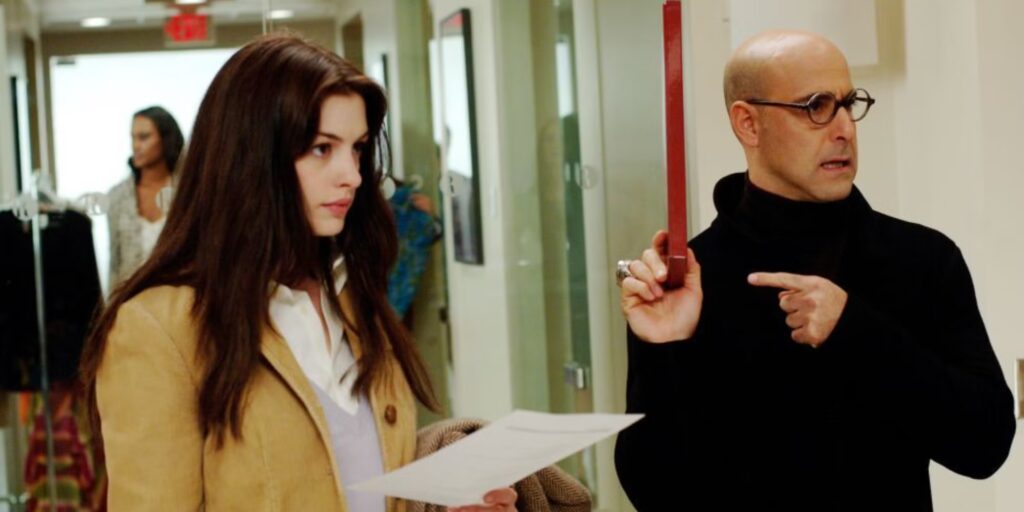
The Devil Wears Prada (2006)
In this breezy comedy set in the offices of a Vogue-like fashion magazine, Anne Hathaway plays a brainy, unfashionable assistant who struggles to fit in among her peers and her boss, the chief editor and titular “devil” played by Meryl Streep.
Tucci doesn’t just walk, he glides through this movie. He plays Nigel, the magazine’s art director, whose pristine bearing is complemented by his wardrobe of well-tailored blazers and smart sweaters. The circular frames perched on his nose give him an air of cool remove and intimate his owl-like wisdom. His experience is further established as he namedrops designers at a rate that would sound like another language to the uninitiated.
As Hathaway’s Andy flounders, Nigel quietly extends an olive branch. He offers her some heels, correctly guessing her shoe size, which she accepts with some hesitation. Andy doesn’t take the hint until later when she breaks down in front of Nigel, who offers some tough love. While calling her out for acting like she’s above it all, Nigel reveals what the magazine meant to him as a boy. It’s a moment of vulnerability from the steely Nigel, which Tucci lets slip as he takes off and cleans his glasses. He’s shedding his armor of cool, but only briefly. That’s all it takes to inspire Andy to fix her attitude and upgrade her wardrobe, with Nigel’s assistance of course, as part of an epic makeover scene.
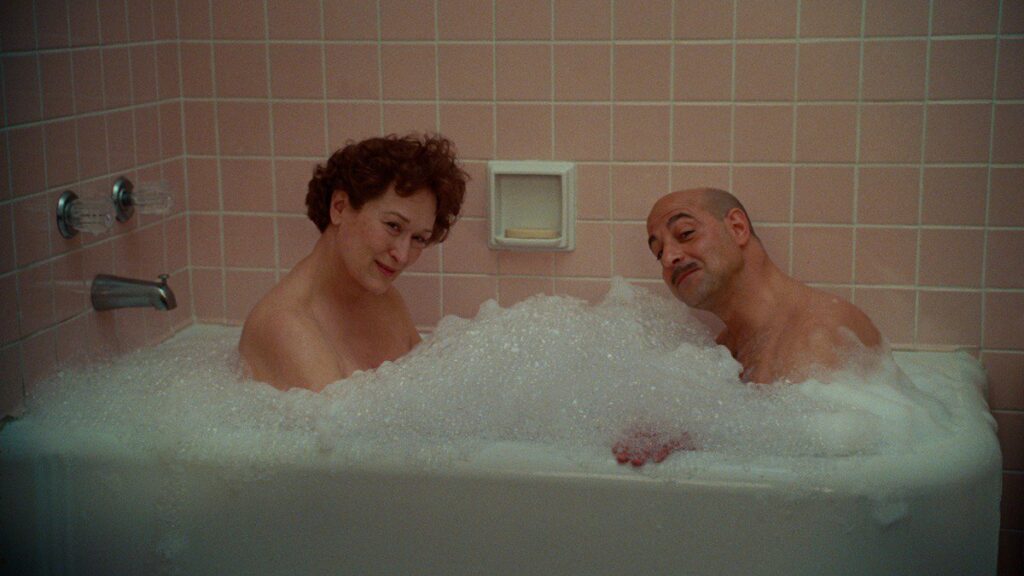
Julie & Julia (2009)
This bifurcated culinary journey follows the legendary Julia Child (played by Meryl Streep, again!) as she co-authors her signature cookbook in the 1950s, crosscutting with Julie Powell in the early 2000s as she blogs about cooking her way through every recipe in Child’s book.
Our man Stanley plays Paul Child, Julia’s husband and number one fan. While Paul may be busy offscreen as a diplomat, when he’s onscreen, he’s admiring Julia. There’s a scene where he’s watching Julia cook as he writes a letter to his brother. We hear what he’s writing in voiceover, where he compares the way Julia cooks to a kettle drummer in a symphony. When Julia’s book is turned down by a publisher, Paul suggests that she would be great on TV. He knows because he already watches her. He’s her first viewer.
My favorite bit of Tucci’s performance comes during a Valentine’s Day dinner scene where the Childs are entertaining friends and telling the story of their later-in-life courtship. As Paul is describing a time when he and Julia were meeting as friends, he has to pause and clear his throat before saying, “and it turned out to be Julia.” The memory of the moment he fell in love with her catches him for the briefest instant. It’s an incredibly lovely moment and indicative of how much Tucci can do in a single beat.
The Lovely Bones (2010)
We’re only making a brief pitstop here because Tucci’s turn as George Harvey—the blue-eyed child killer in director Peter Jackson’s bizarre adaptation of the best-selling novel—is his one and only Oscar nomination. If you want a hint at how Stanley feels about that, just watch his reaction when his name was announced during the ceremony.
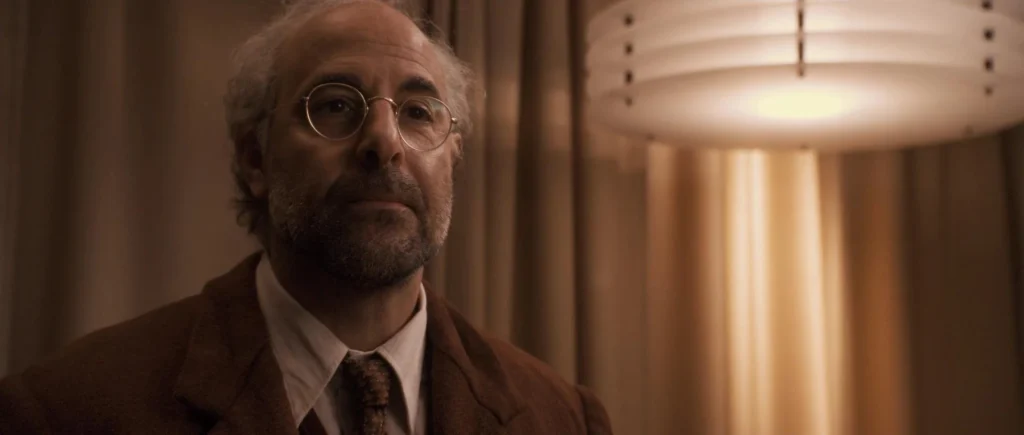
Captain America: The First Avenger (2011)
The film that inspired this article follows Steve Rogers as he goes from a skinny yet scrappy guy from Brooklyn to a super soldier battling against the secret Nazi organization Hydra during World War II.
Rogers is assisted in his transformation into Captain America by Tucci’s Dr. Abraham Erskine, a Jewish German scientist who invents the coveted super-soldier serum. Like skinny Steve Rogers, Dr. Erskine stands out from the other khaki-clad roughnecks of the U.S. military. Erskine is soft spoken and observant. In his first scene, he doesn’t speak. He overhears Rogers expressing his wish to fight in the war despite being turned down multiple times.
When he meets Rogers during an exam, he asks why he’s so persistent. Rogers says he doesn’t like bullies, which resonates with Dr. Erskine, who later uses “bully” to describe another possible super soldier candidate. When Rogers jumps on a grenade during training, not knowing it’s a dummy, Erskine doesn’t have to say another word to confirm that he’s found his guy. Like with his Paul Child performance, Tucci harnesses a quiet ability to watch an exceptional person and share that spark of feeling with the audience.
Side note: Given this summer’s Nazis… We Hate These Guys! theme at the Trylon, a credit in Tucci’s career cannot go unmentioned. Before he was Captain America’s mentor, Tucci played a Nazi officer in the 2001 HBO film Conspiracy, co-starring Kenneth Branagh, about the political machinations behind the Nazi’s “Final Solution.” I’ve never seen it, so unfortunately I’m not sure if any Nazis get punched…

The Hunger Games (2012)
In a dystopian, fascistic United States, the country’s subjugated districts are each forced to pledge two teenagers to fight to the death in a widely televised battle royale.
Tucci’s supporting powers are weaponized in this adaptation of the young adult science fiction series. As Caesar Flickerman, the Master of Ceremonies for the Hunger Games, the actor is hamming it up as a TV talk show host. He’s like if Regis Philbin fell into the vat of chemicals that created the Joker. His teeth are impossibly white under the hot studio lights and his Mozart-like wig appears to have been dyed in blue curaçao.
Caesar is the face of the evil Capitol’s media, but Tucci doesn’t play him as overtly sinister. He exudes enthusiasm and regularly belts out a hearty, percussive laugh. As the contestants are trotted out one by one to be interviewed, Caesar plays the good host and lays the compassion on thick. Tucci doesn’t need to play up the evil, because it’s inherent to the situation. The Capitol may be leading these children as lambs to be slaughtered, but if Caesar sells it like the Super Bowl, his audience will gobble it up and not think twice.
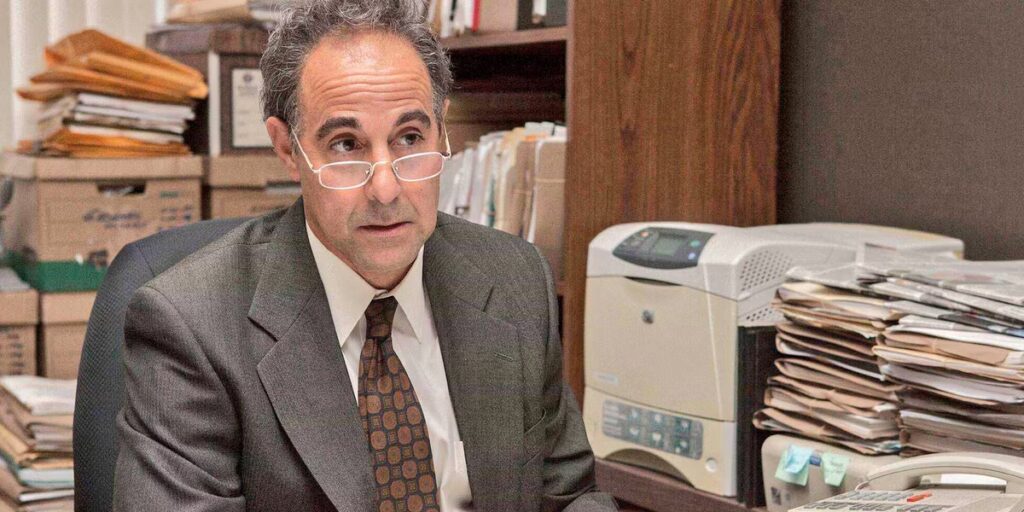
Spotlight (2015)
In this film based on the true story, The Boston Globe’s team of deep-dive investigative journalists reports on the Catholic Church’s systemic cover-up of child sex abuse.
Tucci plays Mitchell Garabedian, a real attorney who represented many victims of abuse in Boston. In one case, Garabedian represented 86 people claiming abuse by a single priest and reached a financial settlement of millions of dollars with the Archdiocese of Boston. The film portrays Garabedian as one of the Spotlight team’s primary sources, although he almost never has time to talk and when he does he peers at reporter Mike Rezendes (Mark Ruffalo) over his glasses with an impatient, penetrating stare. As he tells Rezendes, “I’m not crazy. I’m not paranoid. I’m experienced.”
Once again, Garabedian enables Tucci to play witness. His office reflects his character: the walls are lined with stacks and stacks of legal documents, in and out of boxes. For this man, each document represents a person, and Tucci moves as if he’s carrying all those people on his shoulders. In his final scene, he soberly encourages Rezendes to continue his reporting before entering a room with two clients, both children. He abruptly switches his demeanor to offer a friendly greeting, to make the children feel safe. He’s another man with a hardened shell over a tender heart.
Since Spotlight, Tucci has remained busy, but his choices in roles have been shaky. He’s been in two Transformers movies and played Cadenza the talking cradenza in Disney’s Beauty and the Beast remake. Last year offered a flicker of hope with his part in Conclave as a progressive cardinal who harbors a quiet political ambition, but then he popped up this year in Netflix’s largely derided The Electric State. His Searching for Italy series on CNN was canceled in 2022, but he’s back with Tucci in Italy on Disney+. It seems like you can’t keep the Tucc’ away from a good plate of pasta, but here’s hoping he saves some space for more meaty roles.
Edited by Olga Tchepikova-Treon
